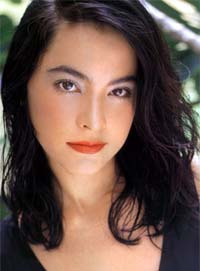|
Intermix.org.uk is a website for the benefit
of mixed-race families, individuals and anyone who feels they have a multiracial
identity and want to join us. Our mission is to offer a view of the mixed-race experience, highlighting icons, film, books, poetry, parenting techniques, celebrities, real lives and much more. Our online forums are a great place to meet others, ask questions, voice your opinions and keep in touch. Sign up for our monthly newsletter and delve into our pages. Want to join in? Become an Intermix member to take part: |
Thailand's Mixed-Race Speak Up
 But conservatives still won't let families mix
But conservatives still won't let families mix
In Thailand they are known as luk krung, which translates as child half and is used to describe those who are part Caucasian and part Thai.
Thirty years ago a luk krung child would have been something of a rarity but now they are far from unusual. They suffer from similar stereotyping as their western counterparts, often being described as exotic and expected to be in the entertainment business. Thai women who give birth to a mixed-race child usually find themselves envied by friends and relatives.
Lanna Cumming, one of Thailand’s newest pop stars, says she had a difficult time growing up. Born to an Australian father and a Thai mother (the famous northern singer Soontaree Vechanont) Lana struggled to find peers to identify with and consequently became quite isolated. When asked if she thinks her racial status has helped her breakthrough as a singer, she said, ‘If you're luk krung, you’re almost expected to be in the entertainment business. I used to get really bored with that kind of expectation – people always seem to expect me to be a certain way – but really that’s not what I’m about. My Thai roots, my Northern Thai roots in particular, are so important to me.’
Po Garden’s mother is Thai, while his American born father took Thai citizenship over fifty years ago. A researcher of social science, Po finds that when he meets people, they always want to know the same thing: ‘The first ten minutes are always taken up explaining who I am. Sometimes Thai people just look at me and ask, ‘What are you?’ That’s been happening as far back as I can remember. I don’t mind, that’s just the way it is.’
'It was only when people like Marsha (Pim Wattanapanich) got famous at the end of the eighties that anyone thought it was cool to be luk krung,’ says Po. ‘Before that luk krung were just some kind of by-products of the Vietnam war, a relic from the time when all the GI’s were here. There are still many conservative families, especially away from the big cities, who won’t let their children mix with people who are different.’
Po, goes on to talk about friends he has, whose families refuse to let their children marry foreigners or outsiders. ‘I think deep down, racism is almost human nature, I think it’s in everyone, somewhere. Growing up luk krung is learning to be proud of who you are, of being different. Finding out ones own identity, ones balance, isn’t a natural process. It’s something you definitely have to work at. I mean you don’t grow up automatically speaking two languages. That’s a sign the parents have done some work.’.
Po says that compromise is the key. ‘I’m not in awe of Western culture,’ he says, ‘and I don’t see the great Eastern wisdom either. I like to think that at some time, everyone will be mixed, I encourage mixing. There’s a lot to be cherished but culture is not a holy thing, it’s always changing.’
To read the full interview by Pim Kemasingki and Mike Atkins, click here:
